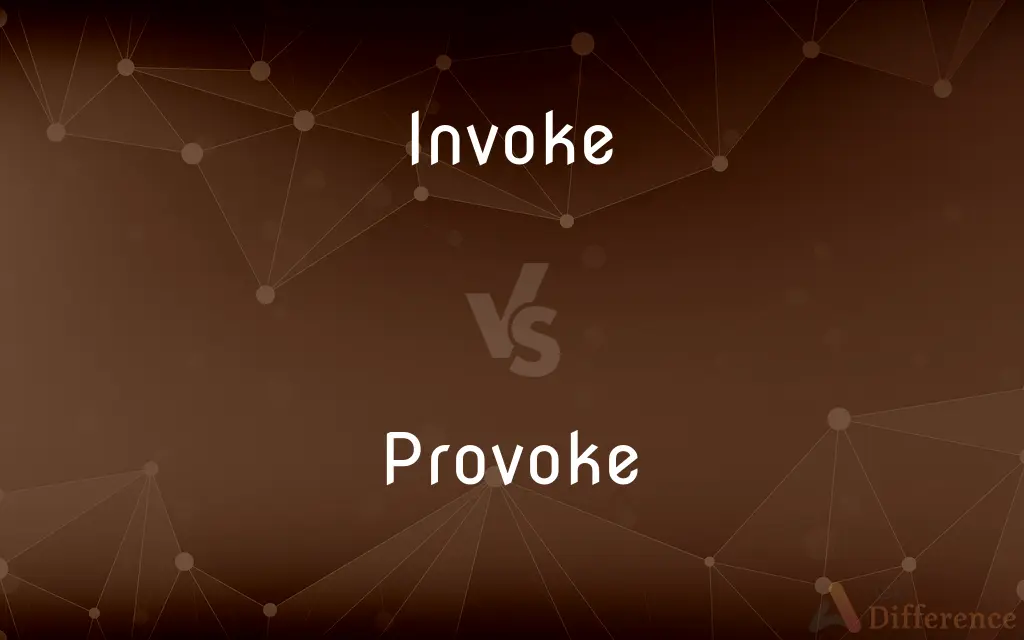Invoke vs. Provoke — What's the Difference?
By Maham Liaqat & Urooj Arif — Updated on March 19, 2024
Invoke implies calling upon something with authority or earnestness, often for assistance or as a citation. Provoke, however, suggests eliciting a reaction, often negative, through actions or words.

Difference Between Invoke and Provoke
Table of Contents
ADVERTISEMENT
Key Differences
Invoke often refers to the act of calling upon something, especially aid or authority, in support of an argument or action. On the other hand, provoke is about stimulating a response, usually by making someone annoyed or angry.
While invoking something generally carries a neutral or positive connotation, depending on the intent and context—calling upon a principle, a right, or supernatural aid—provoke almost always has a negative implication. Invoking seeks to bring something forth or into effect, utilizing a sense of respect or formality. In contrast, provoking aims to stir up emotions, often leading to conflict or heated exchanges.
In the context of spirituality or religion, invoking refers to the act of summoning or calling upon a deity, spirit, or other supernatural entities, usually as part of a ritual or prayer, seeking guidance, assistance, or protection. Conversely, provoking in a spiritual sense could mean challenging or offending a spiritual entity or principle, often leading to negative consequences.
In legal and formal settings, invoking is a powerful tool. It involves referencing laws, principles, or authority to support an argument, establish credibility, or justify actions. This is different from provoking, which has little place in such contexts, except perhaps in the sense of provoking thought or discussion through challenging ideas or statements.
Comparison Chart
Connotation
Neutral/Positive; calling upon assistance or authority
Negative; eliciting a reaction, often annoyance or anger
ADVERTISEMENT
Usage Context
Legal, religious, formal
General, often informal or confrontational
Intent
To summon or call forth with a purpose
To stimulate or incite a reaction, usually negative
Response Sought
Assistance, support, or validation
Emotional, often defensive or aggressive
Example
Invoking a legal precedent in court
Provoking an argument with controversial comments
Compare with Definitions
Invoke
To cite or refer to.
He invoked his childhood experiences in his speech.
Provoke
To deliberately make (someone) annoyed or angry.
She knew just how to provoke him into an argument.
Invoke
To summon into action or bring into existence.
The ceremony invoked ancient spirits of the land.
Provoke
To stimulate or give rise to (a reaction or emotion, typically a strong or unwelcome one) in someone.
The movie's ending is sure to provoke tears.
Invoke
To call upon (a higher power) for assistance, support, or inspiration.
She invoked her guardian angel during times of trouble.
Provoke
To bring about or give rise to.
The policy changes may provoke controversy.
Invoke
To appeal to (something) as an authority for an action or in support of an argument.
The attorney invoked the Fifth Amendment.
Provoke
To elicit a response through a stimulus.
The experiment was designed to provoke a reaction from the subjects.
Invoke
To put into effect or operation.
Invoking emergency protocols was necessary after the accident.
Provoke
To incite or stir up (an action or feeling).
His comments were meant to provoke laughter.
Invoke
To call on (a higher power) for assistance, support, or inspiration
"Stretching out her hands she had the air of a Greek woman who invoked a deity" (Ford Madox Ford).
Provoke
To incite to anger or resentment
Taunts that provoked their rivals.
Invoke
To appeal to or cite in support or justification.
Provoke
To stir to action or feeling
A remark that provoked me to reconsider.
Invoke
To call for earnestly; solicit
Invoked the help of a passing motorist.
Provoke
To give rise to; bring about
A miscue that provoked laughter.
News that provoked an uproar.
Invoke
To summon with incantations; conjure.
Provoke
To bring about deliberately; induce
Provoke a fight.
Invoke
To resort to; use or apply
"Shamelessly, he invokes coincidence to achieve ironic effect" (Newsweek).
Provoke
(transitive) To cause someone to become annoyed or angry.
Don't provoke the dog; it may try to bite you.
Invoke
(Computers) To activate or start (a program, for example).
Provoke
(transitive) To bring about a reaction.
Invoke
(transitive) To call upon (a person, a god) for help, assistance or guidance.
Provoke
(obsolete) To appeal.
Invoke
(transitive) To solicit, petition for, appeal to a favorable attitude.
The envoy invoked the King of Kings's magnanimity to reduce his province's tribute after another drought.
Provoke
To call forth; to call into being or action; esp., to incense to action, a faculty or passion, as love, hate, or ambition; hence, commonly, to incite, as a person, to action by a challenge, by taunts, or by defiance; to exasperate; to irritate; to offend intolerably; to cause to retaliate.
Obey his voice, provoke him not.
Ye fathers, provoke not your children to wrath.
Such actsOf contumacy will provoke the HighestTo make death in us live.
Can honor's voice provoke the silent dust?
To the poet the meaning is what he pleases to make it, what it provokes in his own soul.
Invoke
(transitive) To call to mind (something) for some purpose.
Provoke
To cause provocation or anger.
Invoke
(transitive) To appeal for validation to a (notably cited) authority.
In certain Christian circles, invoking the Bible constitutes irrefutable proof.
Provoke
To appeal. [A Latinism]
Invoke
(transitive) To conjure up with incantations.
This satanist ritual invokes Beelzebub.
Provoke
Call forth (emotions, feelings, and responses);
Arouse pity
Raise a smile
Evoke sympathy
Invoke
(transitive) To bring about as an inevitable consequence.
Blasphemy is taboo as it may invoke divine wrath.
Provoke
Call forth;
Her behavior provoked a quarrel between the couple
Invoke
To cause (a program or subroutine) to execute.
Interactive programs let the users enter choices and invoke the corresponding routines.
Provoke
Provide the needed stimulus for
Invoke
To call on for aid or protection; to invite earnestly or solemnly; to summon; to address in prayer; to solicit or demand by invocation; to implore; as, to invoke the Supreme Being, or to invoke His and blessing.
Go, my dread lord, to your great grandsire's tomb, . . . Invoke his warlike spirit.
Provoke
Annoy continually or chronically;
He is known to harry his staff when he is overworked
This man harasses his female co-workers
Invoke
Evoke or call forth, with or as if by magic;
Raise the specter of unemployment
He conjured wild birds in the air
Stir a disturbance
Call down the spirits from the mountain
Invoke
Cite as an authority; resort to;
He invoked the law that would save him
I appealed to the law of 1900
She invoked an ancient law
Invoke
Request earnestly (something from somebody); ask for aid or protection;
Appeal to somebody for help
Invoke God in times of trouble
Common Curiosities
Can a person invoke themselves?
While less common, one might "invoke" personal principles or past experiences in support of an argument or action.
What does it mean to invoke a law?
To invoke a law means to call upon it as support or justification for an action or argument.
Is invoking always related to spirituality?
No, invoking can also refer to calling upon anything authoritative, like laws or principles, not just spiritual entities.
What is the difference between provoking someone and insulting them?
Provoking someone can lead to a range of reactions, not just anger or offense, while insulting someone is specifically aimed at demeaning them.
Is it possible to provoke a situation instead of a person?
Yes, actions or words can provoke situations, leading to changes or developments, often negative.
Can invoking and provoking be part of the same action?
Yes, in some contexts, the same action could invoke a principle or authority while also provoking a reaction or response.
How do lawyers invoke precedents?
Lawyers invoke precedents by citing past legal decisions as authoritative support for their current case.
What does it mean to provoke thought?
To provoke thought means to stimulate someone's thinking, often challenging existing beliefs or perspectives.
Can you provoke positive emotions?
Yes, it's possible to provoke positive emotions, like laughter or joy, though the term often implies a negative context.
Can invoking be done silently or without direct speech?
Yes, invoking can be a mental or silent act, especially in spiritual contexts.
Is invoking a right always legal?
Invoking a right is typically within legal bounds, but its appropriateness or recognition can vary by jurisdiction.
What role does intent play in determining whether an action is more invoking or provoking?
Intent is crucial; invoking generally implies a respectful or authoritative intention, whereas provoking implies an intent to elicit a reaction, often negative.
How do cultural differences affect the perception of provoking actions?
Cultural backgrounds can greatly influence what is considered provocative, as norms and sensitivities vary widely.
Can historical events be invoked?
Yes, historical events can be invoked to provide context, lessons, or justification for current discussions or actions.
Can animals be provoked?
Yes, animals can be provoked, often leading to defensive or aggressive behavior.
Share Your Discovery

Previous Comparison
Over vs. During
Next Comparison
Testimony vs. TestamentAuthor Spotlight
Written by
Maham LiaqatCo-written by
Urooj ArifUrooj is a skilled content writer at Ask Difference, known for her exceptional ability to simplify complex topics into engaging and informative content. With a passion for research and a flair for clear, concise writing, she consistently delivers articles that resonate with our diverse audience.
















































